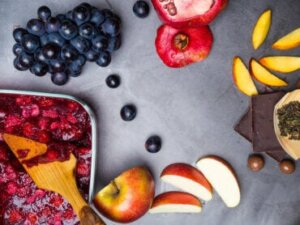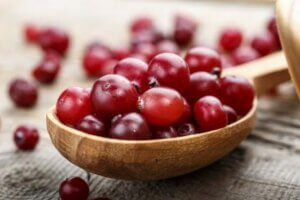Flavonoids: Do They Improve Athletic Performance?

Flavonoids are antioxidant compounds found mainly in vegetables. Consuming flavonoids on a daily basis can help fight aging and oxidative stress.
In fact, studies suggest that regularly consuming flavonoids can have positive effects on your overall long-term health. However, they also have a number of implications within the world of sport. Today, we’re going to look at their importance and what the best sources of flavonoids are.
Flavonoids and sporting performance
There’s a popular belief that flavonoid supplements improve athletic performance. However, an article published in the journal Sports Medicine claims otherwise. In fact, excessive intake of these substances can reduce the body’s ability to adapt to training and, therefore, negatively affects performance.
Only a sudden increased intake of vitamin E appears to have a slightly positive effect on performance. In all other cases, the results are negative. Still, further research is required to identify the role of other antioxidants, such as resveratrol, in sporting performance.
However, it turns out there are some flavonoids which can improve organic functions without deteriorating athletic performance. One example is flavonoids from cocoa.
A study published in Sports Medicine found that an increased intake of this type of antioxidants can improve vascular function and reduce oxidative stress without altering athletic performance.

Should I avoid taking flavonoids?
Whilst consuming a lot of flavonoids can negatively affect athletic performance, this doesn’t mean that you should avoid them completely. In fact, they’re very important for your overall health.
There are no scientific studies that show that sensible consumption of flavonoids will harm your athletic performance, but a lack of them can have serious medium and long-term effects, such as worsening heart function.
This is why it’s best to avoid supplements and instead focus on sticking to a varied, balanced diet that includes flavonoids in normal doses.
What are good sources of flavonoids?
Regularly eating fruits and vegetables is a good place to start. You should also combine raw and cooked foods to avoid the loss of nutrients caused by cooking.
It’s also a good idea to use the stock leftover from cooking vegetables. This contains many water-soluble nutrients and is a good way of making sure that you get the maximum nutritional benefit possible.
Some foods are particularly rich in flavonoids, such as blueberries, grapes, and strawberries.
In fact, red berries are often used in many treatments to slow the aging process because of the proven ability of flavonoids to fight oxidative stress and DNA damage.

If you want to improve performance, choose other supplements
Flavonoids are essential for good health. They’re powerful antioxidants and help keep the body working correctly. Furthermore, regular consumption is linked to good long-term cardiovascular health.
However, they’re not as good for athletic performance as you’d like to think. Studies show no benefits from taking flavonoid supplements, and in fact, consuming too much can even reduce athletic performance.
As a result, it’s best to stick to the recommended daily quantities. A varied, balanced diet will provide you with all the flavonoids you need to look after your long-term health without negatively affecting your sporting performance.
If you want to improve your sporting performance, look to other ergogenic substances that have been proven scientifically. Some popular ones include creatine, caffeine, and ß-alanine. But always consult with a professional if you have any doubts.
Flavonoids are antioxidant compounds found mainly in vegetables. Consuming flavonoids on a daily basis can help fight aging and oxidative stress.
In fact, studies suggest that regularly consuming flavonoids can have positive effects on your overall long-term health. However, they also have a number of implications within the world of sport. Today, we’re going to look at their importance and what the best sources of flavonoids are.
Flavonoids and sporting performance
There’s a popular belief that flavonoid supplements improve athletic performance. However, an article published in the journal Sports Medicine claims otherwise. In fact, excessive intake of these substances can reduce the body’s ability to adapt to training and, therefore, negatively affects performance.
Only a sudden increased intake of vitamin E appears to have a slightly positive effect on performance. In all other cases, the results are negative. Still, further research is required to identify the role of other antioxidants, such as resveratrol, in sporting performance.
However, it turns out there are some flavonoids which can improve organic functions without deteriorating athletic performance. One example is flavonoids from cocoa.
A study published in Sports Medicine found that an increased intake of this type of antioxidants can improve vascular function and reduce oxidative stress without altering athletic performance.

Should I avoid taking flavonoids?
Whilst consuming a lot of flavonoids can negatively affect athletic performance, this doesn’t mean that you should avoid them completely. In fact, they’re very important for your overall health.
There are no scientific studies that show that sensible consumption of flavonoids will harm your athletic performance, but a lack of them can have serious medium and long-term effects, such as worsening heart function.
This is why it’s best to avoid supplements and instead focus on sticking to a varied, balanced diet that includes flavonoids in normal doses.
What are good sources of flavonoids?
Regularly eating fruits and vegetables is a good place to start. You should also combine raw and cooked foods to avoid the loss of nutrients caused by cooking.
It’s also a good idea to use the stock leftover from cooking vegetables. This contains many water-soluble nutrients and is a good way of making sure that you get the maximum nutritional benefit possible.
Some foods are particularly rich in flavonoids, such as blueberries, grapes, and strawberries.
In fact, red berries are often used in many treatments to slow the aging process because of the proven ability of flavonoids to fight oxidative stress and DNA damage.

If you want to improve performance, choose other supplements
Flavonoids are essential for good health. They’re powerful antioxidants and help keep the body working correctly. Furthermore, regular consumption is linked to good long-term cardiovascular health.
However, they’re not as good for athletic performance as you’d like to think. Studies show no benefits from taking flavonoid supplements, and in fact, consuming too much can even reduce athletic performance.
As a result, it’s best to stick to the recommended daily quantities. A varied, balanced diet will provide you with all the flavonoids you need to look after your long-term health without negatively affecting your sporting performance.
If you want to improve your sporting performance, look to other ergogenic substances that have been proven scientifically. Some popular ones include creatine, caffeine, and ß-alanine. But always consult with a professional if you have any doubts.
All cited sources were thoroughly reviewed by our team to ensure their quality, reliability, currency, and validity. The bibliography of this article was considered reliable and of academic or scientific accuracy.
- Andrea JB., Will GH., Impact of dietary antioxidants on sport performance: a review. Sports Med, 2015. 45 (7): 939-55.
- Lieselot D., Danusa DS., Romain M., Elsa H., Cajsa T., Cocoa flavanol supplementation and exercise: a systematic review. Sports Med, 2018. 48 (4): 867-892.
This text is provided for informational purposes only and does not replace consultation with a professional. If in doubt, consult your specialist.








